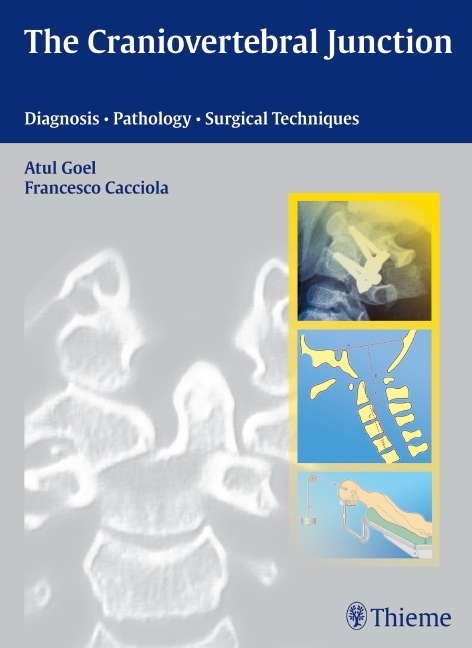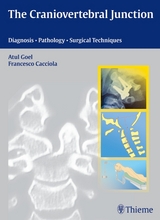The Craniovertebral Junction
Written by masters in the field, The Craniovertebral Junction: Diagnosis, Pathology, Surgical Techniques provides in-depth coverage of up-to-date management principles for this delicate anatomic region.
After a brief introduction to anatomy, biomedical considerations, and embryology, the multidisciplinary team of authors, led by Professor Goel, discusses in detail the most innovative fixation and stabilization techniques for atlantoaxial dislocation, as well as congenital,infective, and acquired anomalies in the craniovertebral junction region. Each concise chapter focuses on a single pathology to guide readers through the nuances of these intricate and demanding surgical procedures.
Features:
- Discusses in detail Professor Goel's groundbreaking treatment methods - now accepted as standards in the field- Covers state-of-the-art protocols and techniques, including alternative treatment protocols for irreducible and rotatory atlantoaxial dislocation and more- Introduces a novel concept of craniovertebral realignment- Over 1,000 high-quality drawings, radiographs, and full-color photographs demonstrate surgery and anatomy and enhance the text- Contains a full section Casebook featuring 22 well-illustrated cases displaying a wealth of pathology- Text is rounded out by practical advice on how to manage trauma, degenerative disorders, infections, and tumors
This fully illustrated manual fills the current gap in craniovertebral junction literature with the clear, accessible information every neurosurgeon, orthopedic surgeon, and spine surgeon needs.
lt;p>I Comparative Anatomy
1 Comparative Quantitative Analysis of Osseous Anatomy of the Craniovertebral Junction of the Tiger, horse, Deer, Bird, and Human
II Basic Concepts
2 Embryology and Development of the Craniovertebral Junction
3 The vertebral Artery in Relation to the C1-C2 Complex
4 Quantitative Anatomy of the Lateral Masses of the Atlas and Axis Vertebrae
5 Biomechanics of the Craniovertebral Junction
6 Biomechanics of the Unstable Craniovertebral Junction
7 Biomechanical Considerations in Craniovertebral Stabilization
8 Radiological Investigations
III Atlantoaxial Dislocation
9 Congenital and Developmental Anomalies of the Craniovertebral Junction
10 Atlantoaxial Fixation Using Lateral Mass Plate and Screws
11 Atlantoaxial Transarticular Fixation Techniques
12 Occipitocervical Stabilization
13 Odontoid Screw Fixation
14 Joint "Jamming" as a Treatment for Atlantoaxial Dislocation and Basilar Invagination
15 Instrumentation in Craniovertebral Junction Surgery
16 Transoral Surgery
17 Vertebral Artery Management in Craniovertebral Junction Surgery
18 Endoscopic Endonasal Surgery for the Craniovertebral Junction
19 Image-guided Surgery in Craniovertebral Junction and Upper Cervical Spine
20 Intraoperative Neurophysiological Monitoring in Surgery for the Craniovertebral Junction
21 Revision Surgery of the Posterior Occipitocervical Junction
22 Techniques of Occipitocervical Fixation
IV Anomalies
23 Surgical Management of Syringomyelia Occurring with Chiari Malformations
24 The Chiari Malformations and Syringomyelia
25 Is Syringomyelia Pathologic, or a Natural Protective Phenomenon?
26 Basilar Invagination: Review and Classification
27 Basilar Invagination: Role of Craniovertebral Realignment on the Basis of a New Classification
28 Vertical Mobile and Reducible Atlantoaxial Dislocation
29 Musculoskeletal Changes in Basilar Invagination
30 "Fixed" (Irreducible) Atlantoaxial Dislocation
31 Rotatory Atlantoaxial Dislocation
V Trauma, Degenerative Disorders, and Infections
32 Trauma to the Craniovertebral Junction
33 Rheumatoid Arthritis of Craniovertebral Junction: Contemporary Surgical Management
34 Atlantoaxial Joint Degenerative Arthritis and Craniovertebral Instability
35 Craniovertebral Realignment for Basilar Invagination and Atlantoaxial Dislocation Secondary to Rheumatoid Arthritis
36 Craniovertebral Junction Tuberculosis
37 Pathogenesis of Ttuberculosis of Craniovertebral Junction: Its Implication in Surgical Management
VI Tumors and Approaches
38 Tumors of the Craniovertebral Junction
39 Peripheral Nerve Sheath Tumors of the Second Cervical Nerve: Anatomical Correlates and Surgery
40 Midline Posterior Approach for Meningiomas of the Anterior Foramen Magnum
41 Lateral Approaches to Anteriorly Located Lesions of the Craniovertebral Junction
42 Far Lateral Approach to the Craniovertebral Junction
43 Extreme Lateral Approach: Anatomy, Pathology and Surgical Indications in Skull Base Surgery
VII Miscellaneous
44 Craniovertebral Junction Anomalies Associated with Metabolic and Genetic Disorders
45 Os Odontoideum
46 Anomalies in Posterior Spinal Segments of Axis
47 Ossified Ligamentum Flavum of the Atlantoaxial Region
48 Unilateral Atlantal Facetal Hypertrophy
VIII Casebook
49 Picture Gallery
| Erscheint lt. Verlag | 12.1.2011 |
|---|---|
| Verlagsort | Stuttgart |
| Sprache | englisch |
| Maße | 210 x 297 mm |
| Gewicht | 1837 g |
| Themenwelt | Medizinische Fachgebiete ► Chirurgie ► Neurochirurgie |
| Schlagworte | Anatomie • Atlantoaxiale Dislokation • Atlas • A. vertebralis • Axis • Biomechanik • Chirurgie • Chirurgische Therapie • Craniovertebral Junction • Diagnostik • Dislokation • Embryologie • Forschung • Hals • Kopf • Kraniovertebrale Verbindung • Management • Neurochirurgie • neurosurgery • Operationsrisiken • Operationszugänge • OPERATIO NSZUGÄNGE • Orthopädie • Orthopädische Chirurgie • orthopedic surgery • Risiken • Risikomanagement • RISIKOMANAG EMENT • Sicherheit • Spine Surgery • State-of-the-art Technik • STATE -OF-THE-ART TECHNIK • Surgery • Therapie • Verbesserung • Vergleichende Anatomie • Wirbelsäule • Wirbelsäulenchirurgie |
| ISBN-10 | 3-13-145581-0 / 3131455810 |
| ISBN-13 | 978-3-13-145581-9 / 9783131455819 |
| Zustand | Neuware |
| Informationen gemäß Produktsicherheitsverordnung (GPSR) | |
| Haben Sie eine Frage zum Produkt? |
aus dem Bereich




